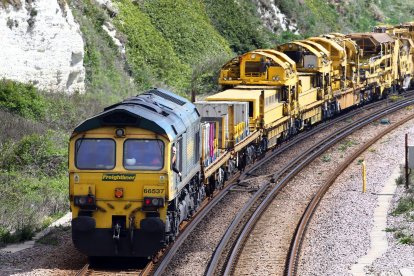Freight train workers strike could cause massive supply chain crisis
This Friday, 60,000 employees nationwide are called off work.

A Freightliner train / Cordon Press
In the midst of a global distribution crisis, the United States is headed for a potential national supply chain crisis after a strike was called by railroad workers across the country. It is the first national strike in the sector in 30 years.
A total of 60,000 employees, including engineers and drivers, have called to strike. Amtrak owns 700 of the 21,000-mile rail network. The vast majority of Amtrak's network is in the northeast of the country, and the impact of the strike will be minimal. However, the remaining 97% of the network is in the hands of transport companies, and the strike could significantly affect their operations.
Chicago
Two unions continue to call on workers to join the strike: SMART, and The Brotherhood of Locomotive Engineers and Trainmen (BLET). They consider that several recent dismissals made for non-compliance were not justified, given that the workers in question had missed work due to medical issues.
Chicago is the hub of the food and commodities market, and if the decision to halt train activity is upheld this Friday, up to 30% of the goods distributed from there would have to wait for shipment.
The strike would also affect Metra, Chicago's commuter rail system. According to Amtrack, if the strike continues, most of Metra's trains would not be able to continue service, as most of the lines belong to freight companies. There are only a few Metra-owned and operated lines that could continue to operate: Metra Electric and Rock Island.
Armtrak Long Distance Lines
There are ten long-distance lines have already been cancelled in advance, in anticipation that a strike could cause greater losses if the planned transports were not cancelled. Amtrak has issued a statement, in which it says it is already taking action:
Amtrak is closely monitoring freight rail labor contract negotiations. The negotiations do not involve Amtrak or its workforce. While we expect the parties to reach a resolution, Amtrak has begun to make incremental adjustments to our service in preparation for a possible disruption of freight train service later this week.
The paralysis of this transportation sector directly affects the consumer sector, and could impact many perishable goods, such as fruits and vegetables. It is also a time of the year when some producers await the harvest, therefore, if transportation is paralyzed, part of the harvest could be lost. Rail transportation can also affect industry in general, if some intermediate goods are missing, other elements of the production chain may be forced to stop.
RECOMMENDATION





















